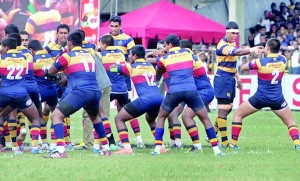What’s the ‘Haka’ happened that day?
View(s):Was performing Haka or a similar version nonsensical and out of place in our culture? There has been much talk about what happened before the Bradby Shield 2nd leg and the performance of Haka. International Rugby Board (IRB) has a protocol clause in its tournament rules that dictates that teams must face the haka, and remain 10 meters on their own side of the halfway line.
This will not only apply to the All Blacks’ haka, but the various challenges performed by the Pacific Island teams as well. Why not extend that courtesy to any team that perform some sort of theatrics that helps the game come alive.

That eventful minute when, a ‘haka’ was physically confronted by an opponent for the first time in the world. - Pic by Amila Gamage
The culture of rugby is about integrity, passion solidarity discipline and respect. So respect the other team before you get on to the field. On the other hand, was this a spontaneous reaction of the team or were they told to start the challenge by intimidation.
If the second is true there are questions that have to be asked from that somebody, especially when the encounter was witnessed by the President of the country, the opposition leader and more importantly the chairman of IRB.
Last year the Bradby brought about a crowd invasion and this year it is another story. These game talks of tradition, rugby spirit and culture and you have a responsibility to set the standard for others to follow. It was only a couple of weeks before that Royal complained about hooligan play by Isipathana. The present behavior gives weight to the other side to ask did you receive what you asked.
The other issue is whether Trinity informed the referee about the Haka so that he could have set protocol. There are lessons to be learnt all round. That is what we have to remember and not seek refuge in making political statements like ‘it is not in the Sri Lankan culture’.
Professor Geert Hofstede explains, “Culture is the collective programming of the mind distinguishing the members of one group or category of people from others.” Thus if you bring a political twist the haka is not Sri Lankan. So be it and rugby may not fit into the system. Having accepted rugby, then accept what goes with it as a sub system.
Last week S. Thomas’ College proved that they are back to challenge the premier division teams of school rugby. They beat St. Josephs College in a friendly traditional match played for the Lady Jayatilleke Trophy. The shrewd captaincy of Devin Jayasinghe took the better of the Joes who led 12 to 6 for a major part of the first half but took lemons at 13 to12 in favour of STC.
The first try started with him — a shrewd move of showing that he was going for goal from a penalty but suddenly changing to a tap the centre scored to take the lead and dominate the game. From there it was a matter of leadership that forced the Joes to have to return the shield to Mount. Joes have proved on many occasions that they know how to make the cake but find it difficult to rub the icing. The crowds showed the character of the friendly nature with crowds of both schools seated close by and time exchange teasing each other or commenting in good spirit.
I could not understand how the Joes gave back the initiative when in attacking positions. A number 6 line out throw gone wild when in an attacking position caused the lead to be extended. Thusitha Peiris the Havelock’s coach lamented that there was almost none in today’s top division schools that can do an effective No.6 throw in a line out. That affects the game at club and national level. Despite that schools opted for a long throw and very often lost possession. This was there at the start of the season and still continues at the end of the season. The question is that of skill improvement.
In an article in this paper last week Nimal Lewke had said “If you look at the situation, what can the Referees Society do against an outsider? You can apply IRB laws for players but you have to fall back on the law of the land when dealing with the crowd because if they come to a match, assault referees and abuse players, they have committed a crime under the penal code”.
That I thought was one of the most sensible statements made about the current situation of handling hooliganism that has pervaded the field. Lewke is much qualified to talk about this as during his period as Vice President and President of the Referees Society and then as President of the SLRFU this was practiced effectively.
Another may be for tournament organizers to start evicting or banning entry to some of the boisterous crowds. One may say that it is not possible or that somebody has bought a ticket. Can you go to a theater, a dance or a musical show and behave bad and say I purchased a ticket. The ticket gives you the right of entry, and may be a seat. It does not give the right to misbehave.
Vimal Perera is a former Rugby Referee, coach and Accredited Referees Evaluator IRB
Follow @timesonlinelk
comments powered by Disqus


